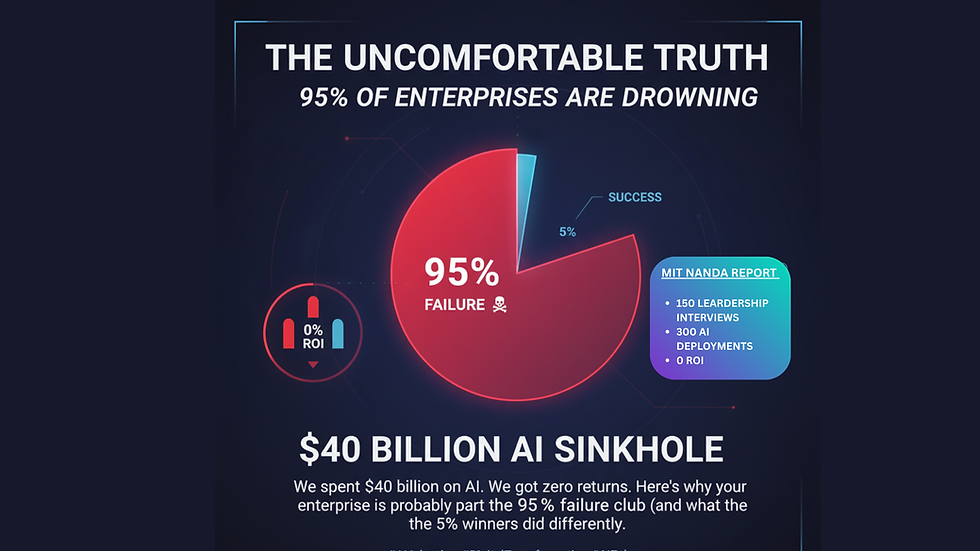The Fusion of Tribal Knowledge, Troubleshooting and AI Agents
- Upinder Singh
- Feb 19
- 4 min read
Updated: Jun 26
In manufacturing, speed, precision, and innovation are the cornerstones of success. Yet, there’s a fundamental problem that often slows everything down: troubleshooting. Too often, we rely on the knowledge passed down from person to person—the so-called "tribal knowledge" that can be powerful but is deeply flawed. This knowledge isn’t written down, isn’t universally accessible, and it’s too easily lost when people move on. It’s time for something better.
Imagine a world where troubleshooting isn’t left to chance, where machines don’t just break down, but predict their own problems before they happen. A world where the most experienced technician is always right there beside you, whether they’re physically in the room or not. This is what AI agents are bringing to the table, and it’s nothing short of revolutionary.
Tribal knowledge is the unwritten wisdom that’s passed through generations of workers. It’s what makes seasoned engineers, technicians, and operators invaluable—they know things that aren’t in manuals or databases. They know the quirks, the patterns, and the subtle signs that point to impending failures. But here’s the catch: this knowledge is limited. It’s tied to people, not systems. When that expert leaves, a huge portion of the factory’s memory walks out the door with them. That’s a problem.
Enter AI Agents
Now, imagine if we could take all that invaluable knowledge—every trick, every nuance—and transform it into something that never forgets.Enter AI agents these are not just smart machines. They’re the next step in evolution—agents that can learn, adapt, and help solve the very problems that once took hours, or even days, to fix.
AI agents are built to learn from real-time data, to spot patterns that human eyes can’t see, and to analyze complex machinery behavior in seconds. But they don’t just rely on data. They learn from people—their decisions, their actions, their experiences. These AI agents can integrate the wisdom of decades of tribal knowledge into their decision-making processes, making troubleshooting faster, more accurate, and more efficient than ever before.
The Synergy Between Tribal Knowledge and AI Agents
While AI can bring vast amounts of data-driven intelligence to the table, there’s still a critical need to preserve and leverage tribal knowledge. By combining both, manufacturers can create a more resilient and innovative service team. Here’s how this synergy plays out:
Documentation and Accessibility of Tribal Knowledge
AI agents can help capture and document tribal knowledge that may otherwise remain unspoken or hidden within the minds of long-term employees. Through natural language processing, AI can transcribe oral knowledge into a digital format and make it easily searchable for others in the team. This preserves knowledge for future employees and helps reduce the risk of losing critical expertise as staff transitions occur.
Training and Onboarding
Onboarding new service team members is an essential part of any manufacturing operation. AI agents can enhance training programs by serving as virtual assistants or providing simulated troubleshooting scenarios based on real-life issues previously encountered. By integrating tribal knowledge into AI-powered training systems, new employees can access hands-on, context-rich learning experiences that might have taken years to gain in a traditional setting.
Real-time Decision-Making Support
Service teams often rely on quick decisions during equipment breakdowns or operational inefficiencies. AI-powered systems can analyze data from various sources like sensors, maintenance records, and user-generated insights. By incorporating tribal knowledge into the decision-making process, AI agents can offer more nuanced advice that takes both technical data and hands-on experience into account. This creates a powerful decision-making support tool that helps team members resolve issues faster and more effectively.
Knowledge Sharing and Collaboration
With the rise of AI agents, service teams can foster a culture of continuous learning and collaboration. AI systems can facilitate knowledge-sharing across teams, departments, or even geographical boundaries. Through collaboration tools and AI-driven platforms, employees can share lessons learned, tips, and problem-solving strategies that incorporate both technical expertise and tribal knowledge. This promotes a more connected and efficient service team, all while bridging knowledge gaps.
The Revolution of Smarter Troubleshooting
Think about how we solve problems today. When a machine goes down, we bring in a technician, maybe even a specialist, and they start diagnosing the issue. It can take hours, sometimes even days, just to identify the problem. But with AI, troubleshooting becomes a dynamic, real-time experience. AI agents are constantly scanning the system, analyzing data, recognizing patterns, and even predicting problems before they happen.
You don’t have to wait for a breakdown to learn something new. You don’t have to wait for a person to remember a specific trick or tweak. The AI learns it all. And not just for one machine, but for an entire factory. It’s like having a team of experts available 24/7, ensuring everything runs smoothly.
Why This Matters
In the end, this isn’t just about reducing downtime or solving problems faster (though, of course, we’re doing that). It’s about creating a system that will serve generations to come . AI give us the ability to capture the things we’ve learned through experience and multiply that knowledge exponentially, bringing it into the future .





Comments